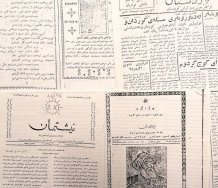
Archives of Omar Sheikhmous
Experts to establish new archive of Kurdistan’s culture, history and politics
An international team of experts are establishing a major new archive of Kurdistan’s culture, history and politics.
University of Exeter academics are working closely with colleagues from leading Kurdish archival repositories, the Kurdish Heritage Institute (کەلەپووری کورد ئەنستیتیوتی) and the Zheen Centre for Documentation and Research (بنکەی ژین) on the project.
Representatives from the organisations signed a Memorandum of Understanding last year. The work builds on the University of Exeter’s Omar Sheikhmous Archive and Digital Archive of the Middle East (DAME) project.
Professor Gareth Stansfield, Pro-Vice-Chancellor and Executive Dean designate of the University of Exeter’s Faculty of Humanities, Arts and Social Sciences, and founding Director of the University’s Centre for Kurdish Studies, said: “Establishing an archive of Kurdish materials, covering many different aspects of Kurdistan’s culture, history, and politics is hugely exciting. Working with our friends in Kurdistan, and in conjunction with leading universities across the world, the Kurdish component of the Digital Archive of the Middle East (DAME) will allow scholars from across the world to access materials that will further understanding and knowledge. We are deeply honoured to be working with our Kurdish partners, and to have received the Sheikhmous archive to begin this work.”
Digital collections are of particular significance to emerging fields such as Kurdish Studies with difficulties of access to primary source materials.
Dr Farangis Ghaderi, research fellow and principal investigator of the Kurdish component of the DAME, said: “The study of materials held at the Zheen and the KHI will bring to light many yet unknown facets of Kurdish history, politics, and culture and will recognise Kurdish knowledge production. Most importantly it is an archive of representation of Kurds by Kurds and digitisation ensures its preservation and dissemination.”
The Zheen Centre has collected endangered Kurdish newspapers, magazines, hundreds of rare books, manuscripts, historically and culturally significant materials, and over 700,000 culturally significant photographs. The Centre is also home to valuable personal collections of Kurdish and Iraqi intellectuals such as Tawfiq Wahbi (1891–1984), prominent Kurdish writer, linguist, and politician. While the Zheen Centre’s archives are focused on Kurdish written heritage, the Kurdish Heritage Institute has worked since its foundation in 2003 to collect, document, and archive the oral cultures of Kurdistan. The Kurdish Heritage Institute has built a rare and unique archive that constitutes a library of 15,000 special books and has amassed over 9,000 culturally significant photos, 23,000 audio and video files, and specific archives on religious minorities in the Middle East, such as Yarsans, Ezidis, Shabaks, and Christians. University of Exeter staff and students will enjoy special access to both archives.
Work has begun on digitising parts of the archive of Omar Sheikhmous (1942-), the Kurdish academic and political activist who was one of the co-founders of the Patriotic Union of Kurdistan (PUK). This is a large archive of some 10,000 documents that include personal papers, historical and political writings, correspondence with Jalal Talabani and other key figures in Kurdish politics, press cuttings, rare documents relating to the foundation and activities of organisations such as the PUK, KDP, KDPI, Kurdish National Congress, and the Iraqi Communist Party, students’ organisations and exile associations, as well as pamphlets, newspapers, periodicals and other primary source materials.
The University of Exeter has also acquired the photographic archive of ‘Chris Kutschera’, the joint pseudonym used by photographer Edith Maubec and her writer husband Paul, which includes thousands of images taken in the Kurdish regions of Iraq, Iran, Syria and Turkey between 1970 and the early 2000s. These include intimate photographs of individuals such as Jalal Talabani, various members of the Barzani family, Sami Abdul Raman, Franso Harîrî, Adnan Mufti and poet Hajar Sharafkandi, as well as scenes from Kurdish villages, camps and cultural life and images of political meetings and delegations.
In addition to this, the University has acquired the Kurdistan Photo Library, a continually expanding digital photographic archive dedicated to Kurdistan and the Kurdish people.
Dr James Downs, archivist of the Middle East Collections at the University and coordinator of the DAME project, adds: “This is a really ambitious project that will transform Kurdish Studies at Exeter, not just in terms of the resources available for research and teaching, but also through the collaborative relationships established with partners in Kurdistan.”
Date: 4 May 2022
